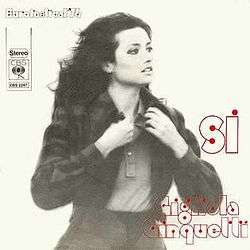Sì (song)
 | |
| Eurovision Song Contest 1974 entry | |
| Country | |
| Artist(s) | |
| Language | |
| Composer(s) |
Mario Panzeri, Daniele Pace, Lorenzo Pilat, Corrado Conti |
| Lyricist(s) |
Mario Panzeri, Daniele Pace, Lorenzo Pilat, Corrado Conti |
| Conductor |
Gianfranco Monaldi |
| Finals performance | |
| Final result |
2nd |
| Final points |
18 |
| Appearance chronology | |
| ◄ "Chi sarà con te" (1973) | |
| "Era" (1975) ► | |
"Sì" (English: "Yes") is the name of the Italian entry to the Eurovision Song Contest 1974, which finished second behind the Swedish entry "Waterloo" sung by ABBA.
Background
The lyrics and musics were written by Mario Panzeri, Daniele Pace, Lorenzo Pilat and Corrado Conti. It was sung in Italian by Gigliola Cinquetti.
During the preview programmes, Cinquetti sang the song alone in a dark room. The music video was broadcast in black and white as RAI did not move to full color broadcasts until 1977. On the Contest night, Cinquetti performed the ballad in a blue dress, accompanied by an orchestra and four teenage female backup singers, dressed in light yellow blouses and autumnal floral skirts. The song is sung in the first person where she reflects and describes her love for a man, and the exhilaration she feels when she finally says "yes" to him, which signifies that they can start the rest of their lives together. Throughout the song, the word "sì" is repeated sixteen times.
It was the seventeenth and final song of the evening, following Portugal's song "E depois do adeus" which was used as a signal in Portugal to begin the Carnation Revolution.[1][2]
Under the scoring system of the time, each country had ten jurors, each of whom allocated one point to the song which they deemed to be the best. Sì received 18 votes in this manner, including five from the United Kingdom, four from Monaco, two each from Finland and Spain, and single votes from Israel, Luxembourg, Belgium, Ireland and Portugal, and went pointless from the other six participating songs [2] It was Italy's second best result to date, with Cinquetti having won the contest with "Non Ho L'Età" ten years earlier.[2][3]
Cinquetti later recorded versions in English ("Go (Before You Break My Heart)"), French ("Lui"), German ("Ja") and Spanish ("Si"), which were released across Europe. A Finnish rendering: "Niin", was recorded by Lea Laven and became a Top Ten hit in Finland.
Censorship of song in 1974
The live telecast of the song was banned in her home country by the Italian national broadcaster RAI as the event partially coincided with the campaigning for the 1974 Italian referendum on divorce which was held a month later in May.[2]
RAI censored the song due to concerns the name and lyrics of the song (which constantly repeated the word "SI") could be accused of being a subliminal message and a form of propaganda to influence the Italian voting public to vote "YES" in the referendum. The song remained censored on most Italian state TV and radio stations for over a month, as a consequence the song failed to enter to Top 40 chart in Italy, and still remains one of the lesser known Eurovision entries in the country. As opposed to "Non ho l'età", "Sì" also failed to make a significant impact on the charts in Continental Europe and Scandinavia - with one notable exception; the English version "Go (Before You Break My Heart)" reached eighth position in the British charts in June 1974, making it one of the very few non-winning Eurovision entries to become a commercial success in the UK.[4]
Charts
| Chart (1974) | Peak position |
|---|---|
| Belgium (Ultratop 50 Flanders)[5] Italian-language version |
30 |
| Germany (Media Control AG)[6] Italian-language version |
13 |
| Germany (Media Control AG)[7] German-language version |
45 |
| UK Singles (Official Charts Company)[8] English-language version |
8 |
See also
References
- ↑ ESCtoday.com, Eurovision Song Contest 1974
- 1 2 3 4 O'Connor, John Kennedy. The Eurovision Song Contest: The Official History. Carlton Books, UK. 2007 ISBN 978-1-84442-994-3
- ↑ Eurovision Song Contest Voting, by year
- ↑ ESCtoday.com, song info "Sì"
- ↑ "Charts Vlaanderen - Gigliola Cinquetti - Si" (in Dutch). Ultratop.
- ↑ "Single - Gigliola Cinquetti, Si" (in German). Charts.de. Media Control.
- ↑ "Single - Gigliola Cinquetti, Ja" (in German). Charts.de. Media Control.
- ↑ "Chart Archive - Gigliola Cinquetti - Go". ChartArchive.org.